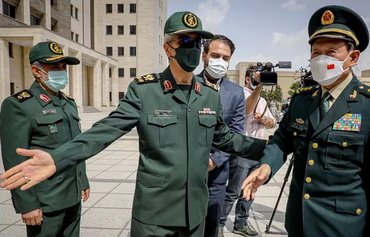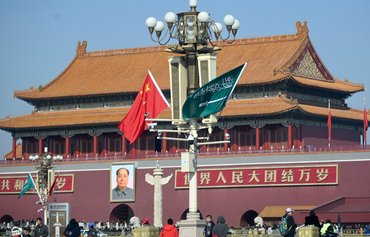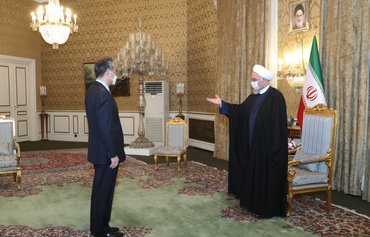News that 5,000 Chinese troops will be deployed to Iran to safeguard Beijing's economic interests has raised hackles in the Islamic Republic, amplifying existing concerns about the secrecy surrounding the 25-year Iran-China deal.
Some domestic critics of the Iranian government have likened the deal to the colonial agreements of the last century, with the prospective military deployment underscoring the colonial nature of China's intentions.
Tehran Chamber of Commerce member Reza Padidar recently made reference to the imminent arrival of Chinese security forces in Iran to protect Beijing's economic interests in light of the deal, signed in April 2021 after five years of secret talks.
News of this deployment, first published three years ago by the Petroleum Economist, has been recirculating on social media for the past month, and has caused a stir in Iran.
![Chinese President Xi Jinping meets with Iranian leader Ali Khamenei in Tehran in January 2016. [Khamenei.ir]](/cnmi_di/images/2022/03/10/34447-Iran-Khamenei-Xi-600_384.jpg)
Chinese President Xi Jinping meets with Iranian leader Ali Khamenei in Tehran in January 2016. [Khamenei.ir]
The Iranian Oil Ministry was forced to deny the reports in a statement, saying they were false and intended to "destroy Iran's relations with other countries".
From Beijing's perspective, "the point of the [25-year] deal is for China to gain a foothold in Iran, particularly on the islands of Jask and Kish in the Persian Gulf," said a former Iranian navy analyst who spoke on condition of anonymity.
Beijing has already constructed a series of ports along the Indian Ocean, creating a necklace of refuelling and resupply stations from the South China Sea to the Suez Canal, and with the deal focus will now shift to the Iranian ports of Jask and Chabahar.
Even if unconfirmed, the reports are fueling concerns about the mechanics of implementation of the Iran-China deal.
The comprehensive, all-encompassing deal has been widely criticised inside and outside Iran, with some of the Iranian regime's opponents calling it the "sale of Iran to China".
Without providing any details, Iranian government officials on January 14 announced that the implementation of the deal terms had begun.
According to Jalil Roshandel, a political scientist and Iran scholar at East Carolina University, "The Islamic Republic thought for several years that proximity to China could bring Iran out of its impasse."
It is apparent that a confidential document has been signed between Iran and China, he said, given the secrecy around the deal. But it is unclear whether this document is binding, he added.
'Colonial agreement'
Iranian leader Ali Khamenei, who rarely holds private meetings with other leaders, reached an agreement regarding the Iran-China deal's framework in a meeting he had with Chinese President Xi Jinping and his delegation in Tehran on January 23, 2016.
Since then, the entire six-year process has been kept secret, and Islamic Republic officials have refused to disclose the substance of the agreement, provoking public criticism and concerns about colonialism.
Iran-based political commentator Sadegh Zibakalam said the deal was "reminiscent of the 1919 agreement with the United Kingdom; an agreement that the Iranian government had signed out of desperation with London amid bankruptcy, which effectively placed Iran under British protection".
The National Front of Iran, a nationalist opposition group whose members are mostly based outside Iran, said in a statement that the Iran deal has not been approved by the Majles (Parliament) and that the public has not been able to vote on it.
The statement said the deal would result in foreign domination of Iran's natural resources, economy and military forces, in violation of Article 153 of the Islamic Republic's own constitution, and is not legally valid.
"By implementing this confidential agreement, the regime has blatantly violated Articles 77, 125, 59 and 153 of its own constitution," the statement said.
Article 146 states that no foreign military base is allowed in Iran, even for peaceful purposes.
The Islamic Republic, which came to power with the slogan "neither East nor West", is now on its way to transforming Iran into a country under the protection and colonisation of the East -- namely China and Russia, the statement said.
Clandestine oil imports
China has significantly increased its oil purchases from Iran since 2017, circumventing the sanctions imposed on Iranian oil.
As of January, several oil traders told Reuters, Iranian shipments have been trading at $5 less per barrel than the Brent standard price.
According to an oil market analyst who wished to remain anonymous, most of Iran's oil exports are headed to China "through complex routes and intermediaries. Plus, a small volume enters Syria every month".
A group of principalists (closely affiliated with Khamenei) say the recent increase in Iran's oil sales is a sign that Iran does not necessarily need to revive the 2015 nuclear deal with the West.
"Principalists may find these kinds of claims useful for deceiving themselves or others, but such claims are not rooted in the truth," said political analyst Ahmad Zeidabadi.
Russia is a prime example of how this type of assumption can backfire.
Russian President Vladimir Putin assumed that Europe's dependence on Russian energy resources would prevent it from imposing sanctions on his country, but his assumption proved to be unfounded, Zeidabadi said.

![Chinese soldiers line up for drills in 2021. [Chinese Ministry of Defence]](/cnmi_di/images/2022/03/10/34446-chinesesoldiers-600_384.jpg)







fake news
Reply1 Comment(s)